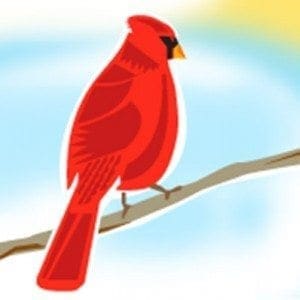In thanksgiving
By FATHER JAMES S. BEHRENS, OCSO, Commentary | Published December 10, 2015
I have been watching a little bird every morning. She makes her appearance perched on the gutter on the roof. She is always in exactly the same spot, her head bobbing around, taking in the view of a new day.
It is too high a spot for me to see if she has a nest up there. I would think that she does since I doubt she commutes to that spot every morning.
There are many fascinating things about animals. And there is much to learn from them. In this season my thoughts naturally turn to themes of gratitude. I suppose that a lot of people will, understandably, give thanks to God for all the blessings he has bestowed. Prayers of thanks will go heavenward—thanks for all the good things that we assume have come to us from God’s love and care.
Looking at that little bird this morning, my mind wandered to thoughts about selfless love. Do birds love like we love? Not quite, but there is a selfless nature to the care they lavish on their young that both astounds and humbles me. Birds—and countless other living creatures in our world—survive and thrive by giving their lives to their young.
Nothing is expected back from their offspring. The young are fed and are taught to fly, hunt, avoid predators, avoid dangers. And then the time comes when, having been prepared to leave and enter the world, they leave the security of the sheltering parents and the cycle of life continues.
Humans tend to look to tangible, maybe even great and wondrous things, for which to express thanks. I suppose that the enormity of expectations that arrive each Thanksgiving moves us to articulate whatever there is in our lives that moves us to express thanks.
The little bird has a past history. A very long history of millions of feathered ancestors who flew, mated, made nests, raised their young and then passed on from this life. They offer us humans a long continuum of the miraculous, when you think about it. A species was crafted with the utmost care to ensure a high degree of adaptation, longevity and the care needed to nurture offspring. And through it all, through the incredible largesse that has taken place for millions of years, the little bird and all living things like her have not and cannot express gratitude. The best they can do is to take what has been given, and in the case of the little bird, rest a bit on a gutter each morning before she sets about the business of the day.
I look back on my life. So much was given to me, to my brothers and sisters. But looking at that bird, I am drawn to think of the magnitude of what has been given and my inability to return it in kind. There has been so much poured into the fleeting instance that is my life, it is impossible for me to return in any way a reciprocal gift. She receives what she has been given and flies with it.
So in this season I may dwell a bit on a different kind of gratitude.
I know that all that has been given to me came through a billion small, but potent, activities in life. Mom calling me to wake up and get to school. The cooking of countless meals. The washing of thousands of baskets of laundry. A million miles in a lot of cars, driving us kids and picking us up. Worries galore, laughter and tears, losses and hopes—the living ingredients of any ordinary life in an ordinary place.
To all of that, I say thanks, and hope to remember that this day will bring many small activities that will bear fruit beyond measure. That is God’s gift to us, the magic he works through human living and loving.
The little bird doesn’t “know” about all this. But she doesn’t have to.
She flies, maybe even soars, and God is happy with her.
And God is happy with us, too. He watches and sends gifts that are sublime in their ordinariness and eternal in their significance.
We humans try to soar and reach places beyond our abilities and fail more often than not. But there are those who will lift us up again and again with words of hope, gestures of kindness or the making of a sandwich. We may not have wings, but we have an awareness that whatever is good in this life always comes to us through love and from God. And that love arrives with each new day, like the little bird on the gutter, looking about and waiting to find its way into our lives.
Trappist Father James Stephen Behrens is a monk at the Monastery of Our Lady of the Holy Spirit in Conyers. His books are available at the monastery web store at www.HolySpiritMonasteryGifts.com.
